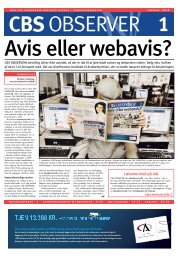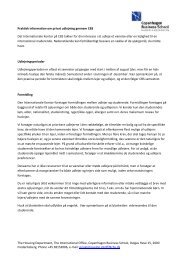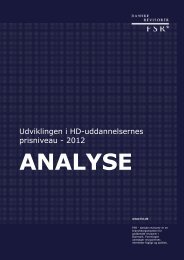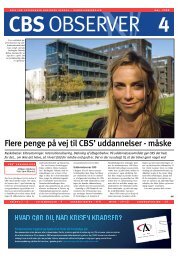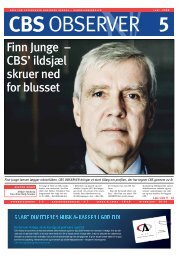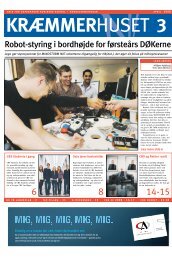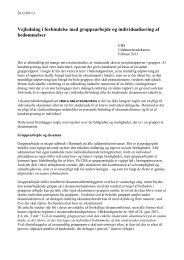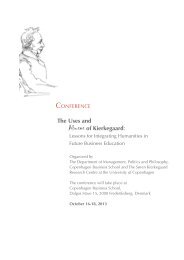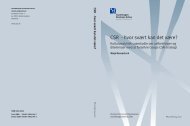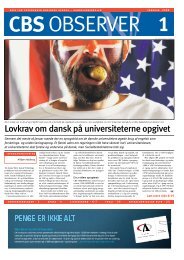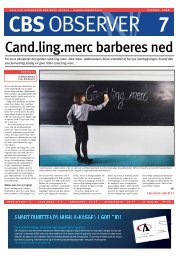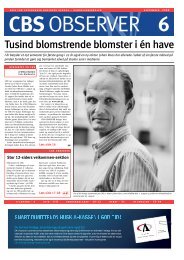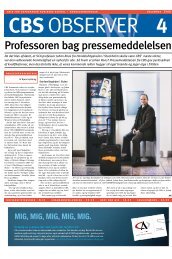2 0a v i s f o r co p e n h a g e n b u s i n e s s s c h o o l – h a n d e l s h ø j s k o l e nu n i - u n i v e r s e tr e d i g e r e t a f l a j k a h o l l e s e nC B S u m m a r ye d i t e d b y t o r k i l b a n gStuderende fik fjerdeplads i Google-konkurrence<strong>Den</strong> danskudviklede koncert-applikation tilAndroid-telefoner, ’Gigbox’, endte som nummerfire i kategorien Lifestyle i Google’sAndroid-konkurrence. Klaus Kartou erspecialestuderende ved datalogistudiet påKøbenhavns Universitet og har udvikletGigbox-applikationen sammen med en andendatalogistuderende, Thomas Jørgensen, og<strong>CBS</strong> studerende Martin Leblanc Eigtved. MedGigbox kan brugeren blandt andet henteoplysninger om koncerter ned på mobilen udc b s o b s e r v e rNæste deadline 14. januarDebatindlæg max. 1 A4-sideSendes til red.observer@cbs.dk1fra lokalitet og band eller spillested. KlausKartou fortæller, at trekløveret nu vil koncentreresig om specialeskrivningen og – på lidtlængere sigt – at udvide og forbedre Gigboxsamt fortsætte med at skrive nye applikationertil Android-platformen. <strong>Den</strong> samledeførsteplads og præmien på 250.000 dollar giktil applikationen Sweet Dreams, der også blevnummer ét i kategorien Lifestyle.Vandt på følelsesladet forhold til pengeMake saving money fun! Sådan lød udfordringenfra Stanford University, da deninternationale Global Innovation Tournamentblev sparket i gang. Det danske vinderteammed studerende fra KU, <strong>CBS</strong> og ITUhar skabt deres video, ’Memorybanking’,ud fra et koncept om at relatere til pengevia følelser. Fredag den 20. november blevvinderne af den danske konkurrence kåretaf undervisningsminister Bertel Haarder. 1.pladsen – og præmien på en rejse til StanfordHjælp at hente til iværksættereKøbenhavns Erhvervscenter, KEC tilbydergode startbetingelser for kommende iværksætterepå Københavns Universitet, DTUeller <strong>CBS</strong>. Først og fremmest er der tale omerhvervsfaglig sparring som supplement tiluddannelsesstedernes egne initiativer og dermedbidrage til at fremme det erhvervsfagligesamarbejde med erhvervslivet. Derudoveryder KEC praktisk rådgivning til nystartedeog etablerede virksomheder. Det gælder såledesproblemer med myndighedstilladelser,(www.Version2.dk den 01.12.2009)University – gik til et hold studerende fraCampus Copenhagen. Campus Copenhagener et samarbejde mellem Væksthuset Katalystpå Det Humanistiske Fakultet, KøbenhavnsUniversitet (KU) og IDEA House på <strong>CBS</strong>.Sammen med en studerende fra ITU, MartinLyng-Petersen, har de tre studerende, AnnaHolst (<strong>CBS</strong>), Bjarke Christiansen (KU) ogChristian Claudi (KU) lavet videoen med titlen’Memorybanking’.(www.KU.dk, den 24.11.2009)forretningsplaner og budgetter, ligesom mantilbyder en række kurser og rådgivning.- Vi sidder ikke på hænderne og venter påat iværksætterne kommer til os. Vi opsøgeraktivt de studerende og kommer med input,der kan give dem mod på at starte for sigselv. Vi har jo en indgroet lønmodtagerkulturi Danmark, og den vil vi gerne være med tilat ryste lidt op i, understreger erhvervsrådgiverGiovanni Orio.(Urban den 11.11.2009 )Idérige IDEA House <strong>CBS</strong> tiltrækker studerendeStudentervæksthuset IDEA House <strong>CBS</strong> harpå blot et år oplevet en voldsom stigning iantallet af tilknyttede <strong>CBS</strong> studerende. Sidenvæksthuset åbnede i november 2008 med tiengagerede studerende tilknyttet er medlemstalletfemdoblet. IDEA House <strong>CBS</strong> er det enestestudentervæksthus på <strong>CBS</strong>, der tilbyderstuderende at arbejde med entrepreneurshipi praksis. Dette er, ifølge projektleder NynneChristiansen, en meget vigtig grund til denstore efterspørgsel:- Vi oplever en kæmpe lyst hos de studerendetil at bruge den teori, de lærer på<strong>CBS</strong>, i praksis, og <strong>CBS</strong>-studerende er genereltmeget entreprenante i deres tankegang.I IDEA House <strong>CBS</strong> giver vi dem skubbettil at komme i gang med at realisere deresprojekter og virksomheder, forklarer NynneChristensen.(www.idea-newsblog.dk, den 5.11.2009)MBA er en investering i virksomhedenAsger Sandberg Petersen blev ansat somslagsdirektør i Apport Systems A/S i foråret2006. Apport Systems leverer lagerstyring– lige fra software til teknologi med stemmestyring,stregkoder og trådløse apparater.Virksomheden havde imidlertid et ønskeom at blive mere kommerciel. <strong>Den</strong> nytiltrådtesalgsdirektør kom derfor tilbage påskolebænken på Handelshøjskolen, AarhusUniversitet, hvor han læste en Executive MBA(E-MBA) fra august 2006 og to år frem.- Det gode ved den her Executive MBA, somhedder ’ledelse i forandring’, er, at den ermeget oplagt til vores virksomhed. Vi varseks-otte mand, da jeg startede, og i dag er vi15. Så vi har været inde i en voldsom udvikling,fortæller Asger Sandberg Petersen.Uddannelsen kostede Apport Systems cirka300.000 kroner.(Erhvervsbladet den 06.11.2009)Business Language bachelor programs made overThe language study programs at <strong>CBS</strong> are in the middle of an extreme makeover. Before 2007<strong>CBS</strong>’ business language bachelor programs have focused on the students gaining specializedforeign language skills, but since then a transformation has started. The study programs have,guided by student demands shifted their focus more towards the needs of the business world.What used to be the secondary focus of the study program – the profile subject such as marketingor corporate communication – is now the main focus while the language skills havebecome secondary. This was deemed necessary to keep the language study programs sustainablewith a high intake of new students and a high percentage of them actually completingthe programs.- Our feedback told us that the studentswere more in love with the profilesubject than the foreign language.Hence, we have chosen to concentrateon the educational standards set bythe subject, but mixing it across allinvolved departments, explains AlexKlinge, Head of <strong>CBS</strong>’ Department ofInternational Language Studies andComputational Linguistics. Two newstudy programs have already emergedfrom this process, the BA in Englishand Organizational Communication- We have chosen to concentrate on the educationalstandards set by the subject, but mixing it across allinvolved departments, explains Alex Klinge.Female managers – Join Us!and the BA in Intercultural MarketCommunication. A third bachelor programis still in the melting pot, the BAin Area Studies.<strong>CBS</strong>’ top management consists of four people out of which there are no women. If you lookat www.cbs.dk’s organizational diagram, you will find that about half the middle managersin administration are women, while out of 26managers in research, education and communicationonly four are women. The head of <strong>CBS</strong>’ HRServices, Director Claus Durck Hovej, readily takesresponsibility for the low percentage of femaleleaders at <strong>CBS</strong> and doing something to changethis.- <strong>CBS</strong> should be an attractive work place forwomen, also in management, and we should workto change the present situation. As I see it, it is apart of the “Join Us!” principle, Claus Durck Hovejsays.Associate Professor Betina Renisson fromthe Department of Management, Politics andPhilosophy has women in management as herfield of research. According to her <strong>CBS</strong> is a verygood example of the famous ‘glass ceiling’ metaphor;women can see the top level but whenthey try to reach for it, they hit a glass ceiling. Itshould in her opinion, however, not be a projectfor the women to break through the ceiling, butfor everybody at <strong>CBS</strong> to bring it down:- Our motto should be “Women: Unite! andMen: Join Us!”, says Betina Renisson.Partners in research<strong>CBS</strong> Corporate Partners are not just in it for the right to put up corporate plagues and thelicense to sponsor <strong>CBS</strong>. They have also committed to participate in research projects. DEABusiness Researcher Award-winner of the year, Professor Anne-Marie Søderberg, took severalpartners on their word on this commitment when she contacted them during the summerof 2007 and got them to enroll in a nine million DKR research project funded by <strong>Den</strong>mark’sStrategic Research Council.Usually, however, <strong>CBS</strong> does not get the commitment in writing when the school’s researcherspartner up with business in research projects and knowledge sharing. According to <strong>CBS</strong>’ Deanof Research, Alan Irwin, the researchers tend to make more informal contacts with business,pointing out that this is in fact not a bad thing, as knowledge sharing is best done informally.Partnering up with business is, however, not for <strong>CBS</strong>’ academic staff alone. Asian StudiesProgram student, Peter Knudsenhas launched a matchmakingsite, StudentProjects.dk. He aimsto engage students and businesspartners, so that students aimingto hand in their bachelorthesis in the spring of 2010 canbe matched up with real-lifebusiness cases to work on intheir projects.Cartoon caption: - I’m the living proof that sometimes theydo commit.Associate Professor Betina Rennison andhead of HR Services, Claus Durck Hovej,are on level when it comes to equality.1
c b s o b s e r v e r 9 d e c e m b e r 2 0 0 9 2 1No facilities for local socializing<strong>CBS</strong> is very supportive of Campus activities that cross the boundaries of study programs. But theadministrative concern for the social life at the program level is noticeably absent. <strong>CBS</strong> Studentsdemand direct funding of student associations, and <strong>CBS</strong>’ administration taking a second lookYour friendly gatekeeper at the entrance to <strong>CBS</strong> on a Thursday night. ’Torsdagsbar’ at Nexus is one of the fewoccasions for socializing at <strong>CBS</strong>.p l a c e a n d s p a c eAf Ulrik BorchPhoto: Liselotte ØstergaardMany students have hit their headsagainst the wall when trying to finda place to get together with theirclassmates after school. Time aftertime they have been told that <strong>CBS</strong>does not have adequate facilitiesfor catering to this need. The difficultywith finding a place to socializeafter class illustrates a socialoversight at <strong>CBS</strong>.At <strong>CBS</strong> the social environment isevaluated as a part of the school’slearning environment – in the studyboards, in different course evaluationsand once every three yearsas a part of the overall evaluationof the learning environment. Whilethere is agreement that there is acorrespondence between the socialand academic aspects of Campuslife, the administration at <strong>CBS</strong> hasyet to develop a strategy for thesocial environment at the localstudy program level.Diversity at the cost of unityDiversity Day at <strong>CBS</strong> on November12th presented a number of studentorganizations that offer opportunitiesto participate in extracurricularactivities. In 2004 <strong>CBS</strong>’ administrationstarted a programme calledDiversity@<strong>CBS</strong> aimed at bringingstudents together across studiesand different national and ethnicbackgrounds. But somewhere itappears to have forgotten to developa policy to address the demandsfor after-school activities at the programmelevel.- Diversity@<strong>CBS</strong> is a great initiative,but it is also important tosupport local activities. We offera grant with a standard amountof DKR 10,000 to the individualprogram student associations, andwe would like to see the administrationalso doing something, saysJenskumar Sivagurunathan, <strong>CBS</strong>Students’ chairman.Currently the Study Board atHA (psyk.) (BSC Business andPsychology) is the only StudyBoard to sponsor its student associationwith DKR 15.000 – anamount that is doubled by <strong>CBS</strong>Students matching it. Director ofCampus and Facilities at <strong>CBS</strong>, GertBechlund supports this move, buthe would like to see more than justmoney on the table:- First of all we have to admitthat <strong>CBS</strong> needs to do more to provideits students with adequatefacilities for so-called extracurricularactivities. We have noticedthat many students want to engagethemselves in the Campus life, andI don’t think it can be denied thata strong social environment helpsimprove the academic life as well,Gert Bechlund points out.<strong>CBS</strong>’ social oversightThe most apparent issue is the lackof places for the students to gettogether and socialize after school.The student-run student bars at<strong>CBS</strong>, Nexus and La Cable, the latterof which is scheduled to start runningagain in 2010, are the kind ofplaces where you get together withyour friends in general rather thanwith your study program co-students.The problem is that there areno alternative places to go unlessyou are willing to leave campus.Although he points to differentdemands facing the administrationof the facilities at <strong>CBS</strong>, GertBechlund concedes that the lack ofplaces dedicated to social activitiesis regrettable:- In the past decades of expansionat <strong>CBS</strong> the architecture hasfailed to make room for the afterschool social activities that arealso an important part of what wecall a learning environment, GertBechlund explains and continues:- Our buildings are not suited forparties and other kinds of socialarrangements. Nexus for instance islocated in-between learning facilities,and we need guards presentto see that the number of entrantsdoes not exceed the limit set by thenot-so-lenient Fire Department.Still Sivagurunathan doesn’tunderstand why programmes can’tget a room for after school activities,referring to the students atBusiness and Philosophy whomeet once a week outside school.He grumpily mentions the postponementof the construction ofa student house, “Studenterhuset”.Studenterhuset was scheduled tostart construction in the fall of 2009but its constructionis currentlyon hold. Thoughthe prospectsfor its initiationare unclear, GertBechlund claimshe still has faithin the project.An optionmight be toallow studentsthe use some ofthe class roomsthat are oftenempty in theafternoon as aplace to hang out after school –ideally including a beer or two, butmaybe just for a cup of tea and aboard game, a place to listen tosome music and socialize with theother years of your programme.- We are willing to help studentsfind a place to arrange meetings,watch a movie and so on, but upuntil now we have not allowedarrangements in classrooms toinclude eating and drinking, GertBechlund remarks to that idea.Every program for itselfAs things stand mpw, some studyprograms have strong social environmentsand meet frequently andacross the different years whileothers don’t even have a studentassociation. Although the social environmentby nature must be basedon student initiative, <strong>CBS</strong> could domore to help encourage it:- DKR 10,000 is not a lot comparedto the size of a programbudget, Jenskumar Sivagurunathansays, pointing to the HA (psyk.)‘In the past decadesof expansion at <strong>CBS</strong> thearchitecture has failed tomake room for the afterschool social activities thatare also an important partof what we call a learningenvironment.Gert BechlundDirector of Campus andFacilities at <strong>CBS</strong>Study Board’s sponsorship of itsstudent association – somethingthat is appreciated by the programsstudents:- It’s really great! People from allyears meet up and have a beer.This also contributesto theacademic sideof things. Westarted out with100 students inclass, which wastoo many forthis, but nowwe’re down to60-65 and youcan actuallymanage to havea relationshipwith everyone,says PhilipMaruszewicz, anenthusiastic second year HA (psyk.)student.Gert Bechlund is open toaddressing the issue, but has otherconcerns than merely a sponsorship:- Maybe we should also considermaking it a school policy that theStudy Boards are responsible foroverlooking and supporting theirown program’s social environment,not only economically like HA(psyk.) but perhaps also by providingideas and helping to build upa social environment that is notbased in a physical environment,but is located in between the students,he says.Establishing social activitieslocally will obviously continue tobe almost completely dependent onstudent initiative, and with no placeto call their own, students who arewilling to work towards strengtheningtheir study program’s sociallife at <strong>CBS</strong> will continue to face atough job.1Socializing in a large scale. If you want to get cosy with your fellow students and want to stay within the <strong>CBS</strong> confines,there is almost nowhere else to go but Nexus.



